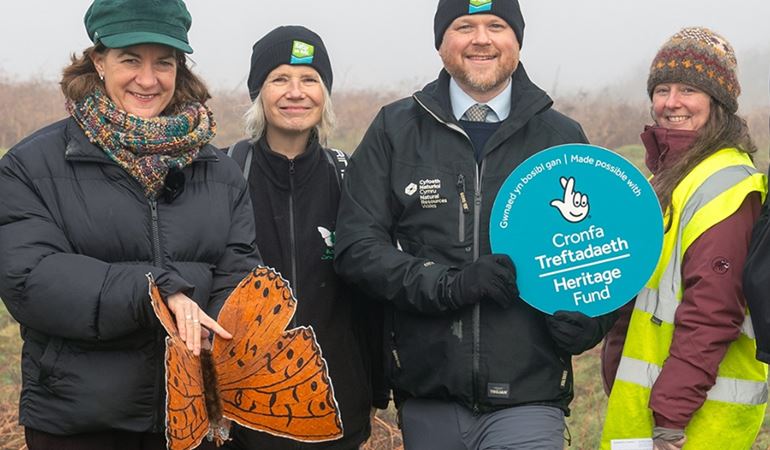First Minister visits UK’s rarest butterfly colony

First Minister of Wales, Eluned Morgan, has visited a rare butterfly colony in Bridgend – the last of its kind in the country.
The high brown fritillary, the UK’s most endangered butterfly, has been the subject of several conservation projects in Wales over the years.
The current project is a part of Wales’ flagship species recovery partnership, Natur am Byth (NaB) and aims to work alongside local farmers to help boost the insect’s natural habitat.
Safeguarding
NaB, funded by The National Lottery Heritage Fund and Welsh Government, works with a range of organisations and charities to help safeguard 67 threatened species across Wales.
The High Brown Fritillary project, along with NaB as a whole, are currently welcoming new volunteers in 2025 to take action for nature. Volunteers will be helping to safeguard important species while gaining valuable work experience in fields like conservation and nature.
With 11 projects active across Wales, nationally co-ordinated events and learning activities, there are volunteer roles and drop-in sessions to suite any skill levels and backgrounds.
John Clark, Programme Manager for Natur am Byth said: “The High Brown Fritillary project has made huge strides in safeguarding this rare butterfly, seeing an increase in volunteer led habitat management for the species.
“It was great to have the First Minister take an interest in such an important site and that the brilliant conservation work being done there is getting the limelight it deserves.
“We’re currently accepting volunteers across Wales that have an interest in connecting with nature and working within conservation.
“This sort of work has an amazing ability to boost our physical and mental wellbeing, so now is the perfect opportunity to volunteer in your patch.”
Legacy
Alan Sumnall, Butterfly Conservation, Head of Conservation Wales & Northern Ireland said: “Legacy is crucial to this project to ensure the UK’s rarest butterfly continues to thrive in this special site.
“We have fantastic volunteers but many of them have been doing this for years and we need more volunteers to continue their great work.
“We also really want to work with more landowners in this area so we can start expanding the High Brown Fritillary habitat further across this whole region.
“We are appealing for all local landowners who love nature to get in touch so we can secure the future of these beautiful butterflies and many other wonderful species.”
Andrew White, Wales Director for National Lottery Heritage Fund said: “Natur am Byth is one of the most ambitious conservation programmes ever undertaken in Wales with their aim to protect and save 67 of Wales’ most vulnerable species.
“Protecting the environment is one of our four investment principles, so nature is at the heart of what we do.
“It’s wonderful to see the impact of the work of staff and volunteers and witness first-hand what is made possible by National Lottery players.”
Everyone is welcome to join the Natur am Byth journey – use the #NaturAmByth on socials to search for volunteering opportunities across NRW’s platforms, or check out the NRW website or sign up to the programme newsletter to find out more.
Find out more about Butterfly Conservation’s work in Natur am Byth and how to get involved at butterfly-conservation.org/in-your-area/welsh-office/natur-am-byth-high-brown-fritillary-vale-of-glamorgan
Support our Nation today
For the price of a cup of coffee a month you can help us create an independent, not-for-profit, national news service for the people of Wales, by the people of Wales.






Glad they kept the location quiet!